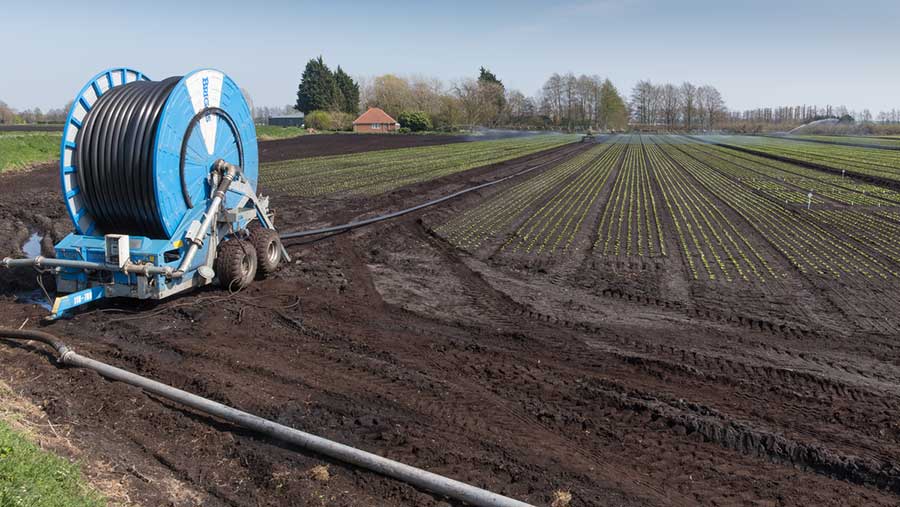Defra plans to abolish water abstraction licences
 © Tim Scrivener
© Tim Scrivener Defra plans to abolish water abstraction licences and introduce a system of permits signal a major upheaval for farmers, say industry leaders.
Government proposals will see new abstraction rules introduced from the early 2020s – in a move farmers fear could reduce the amount of water they are allowed to use.
The proposals focus on the management of surface water at the catchment scale and are in response to Defra’s 2014 consultation, “Making the most of every drop”.
Abstraction licences will be replaced by new permits, with volumes based on how much water farmers have used over the past 10 years, rather than their current entitlement.
Any “unused headroom” will be removed and section 57 restrictions that currently apply only to spray irrigation licences will disappear.
Yorkshire vegetable grower Guy Poskitt said it was important that farmers had adequate access to water when they needed it.
See also: Changes to water rules ‘threaten farming’
“We need to ensure we have plenty of water – a good resource of water,” he said.
“We need to ensure that government understands what we need, because one year you might need a lot and another year you might not.
“It is a complex issue and we need to lobby hard for water storage; there is plenty of water we could store at the moment but we can’t get capital allowances on that.”
NFU national specialist for water resources Paul Hammett said: “These proposals signal a major upheaval to the current abstraction licensing system.
“It’s absolutely vital that they deliver a fair share of water to help our farmers and growers produce affordable, high-quality food.”
Mr Hammett said the reform package should be underpinned by measures such as tax incentives, which would encourage farmers to build reservoirs that could store surplus river water.
“It is also important that Defra’s 25-year plan for food and farming – due out later this year – recognises the close link between food security and water security,” he added.
“Secure access to water at times of drought is crucial for our members and we will continue to focus on the Defra’s plans for managing water at low river flows.
Mr Hammett said the NFU welcomed the proposed abolition of section 57 restrictions that currently apply uniquely to farmers and growers.
But abstractors would still face more general restrictions during times of low river flows.
The NFU would will continue to press for “water for food” to be recognised as a high priority use during times of shortage, said Mr Hammett.
“The challenge facing the agrifood sector lies in ensuring that producers are given a fair allocation of water for food production when existing licences are transferred to new permits.”
It was important that any changes were introduced at a pace which that farming businesses sufficient time to adjust and invest in water security and efficiency measures.
Damian Testa, head of land use policy at the Country Land and Business Association, said there would likely be winners and losers from the proposed new system.
“Certainty and security of supply for farm businesses to continue to abstract the water they need to produce food is critical,” said Mr Testa.
“We welcome the ability to store bonus water in water-scarce catchments when flows are high, and the removal of seasonal restrictions.
“However, if unused licence volumes are removed or restrictions imposed based on average usage, farmers will be hit hard.
“Not only could this damage food production, but also limit the possibility of the expansion of their businesses, affect capital values and leave jobs at risk, too.”
Defra said the new permits will allow abstractors to take water at any time when flows are high, meaning they can store it for when flows are low, and make better use of reservoirs.
It said all abstractors directly affecting surface water will have conditions on their permits that enable flow-based controls to protect the environment.
Abstractors currently without flow-based controls will have new conditions on their permits.
The government said these new conditions will enable a gradual approach to implementing controls to protect the environment at low flows tailored to local conditions.
Defra said this approach will be “fair, evidence based and proportionate, taking into account the needs of essential users and improve our ability to manage our natural water asset”.
